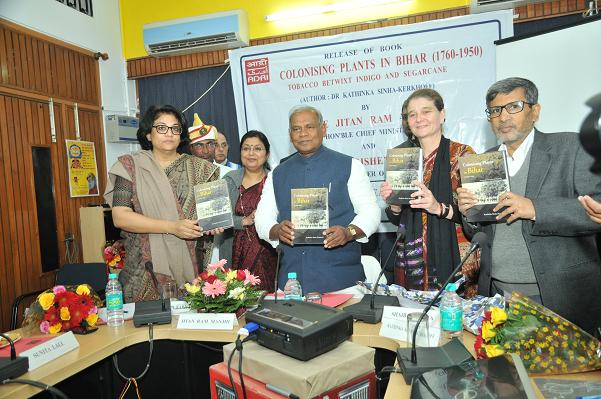Events of ADRI Patna

Since the consumption of tobacco is not desirable, cultivation of tobacco is no longer promoted. But because cash crops form an important component of farmers' income, crops like indigo, tobacco and sugarcane much influence the nature of agrarian economy." Chief Minister Shri Jitan Ram Manjhi said this while releasing a book Colonising Plants in Bihar (1760-1950) - Tobacco Betwixt Indigo and Sugarcane at ADRI here on Saturday. The book is authored by Dr. Kathinka Sinha-Kerkhoff, a renowned scholar in Social Anthropology and History, and has been associated with ADRI for a long time.
Talking about the book, Mr. Manjhi said that generally, 'social history' comprises how men interact with other men to create social movements. But here the author has shown how men interact with nature to create social history. In the book, the part of nature that the author specifically focuses is ‘cultivation of tobacco'. Terming the author's book to be an important contribution to the social history of Bihar, the Chief Minister said: "the research study also shows how the colonial administration tried to influence India's agriculture. The cultivation of tobacco was introduced and promoted by the British, for purely colonial interest. But it had some positive effects for Bihar's economy - it had led to agricultural research in India, and the establishment of the Agricultural Research Institute in Pusa." Dr. Shaibal Gupta, member-secretary of ADRI, welcomed the guests on the occasion. In his address, Dr. Gupta said: "we all know how Bihar was put on the world map because of Gandhi's Satyagraha against indigo cultivation in Champaran. Yet, this socio-cultural and political-economic history of tobacco trade, cultivation and consumption in the adjusting region of Darbhanga not only changes this story somewhat but also explains the replacement of indigo by sugarcane in Champaran." Dr. Gopa Sabharwal, Vice-chancellor of Nalanda University, presided over the function. Dr. Sabharwal in her remarks said: "this unique study contributes to three important research fields: the history of commodities, the history of the colonial development state, and the agrarian history of South Asia. First, by taking tobacco, indigo and sugarcane as case studies, the author demonstrates the dynamism of cash-crop production systems and how these systems influenced each other. In a historical process described by the scholar, indigo became to be seen as an alien plant linked to exploitation whereas tobacco with its origin in South America became linked to Bihari identity in the form of chewing tobaccos. Second, the book explores how colonial state policy came to stimulate research-based agronomic interventions, often with unintended consequences. And finally, the book shows how cash cropping entangled Bihari peasants in particular Koiris and Bhumihars as well as Indian nationalists and Europeans in particular so-called indigo planters, scientists and colonial administrators in new forms of struggle and cooperation. This meticulous and illuminating study deserves a wide readership." ADRI Director PP Ghosh gave the vote of thanks on the occasion.